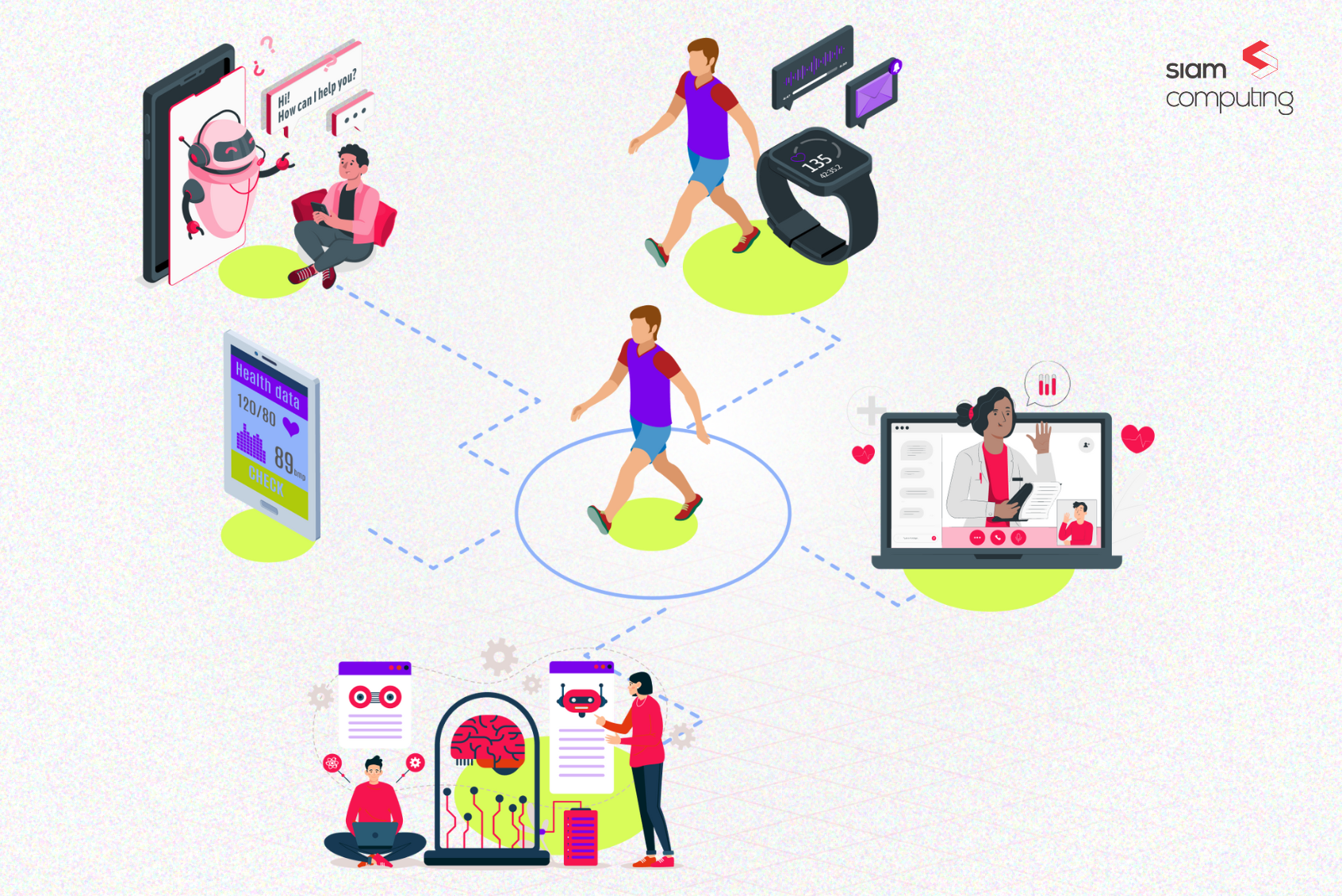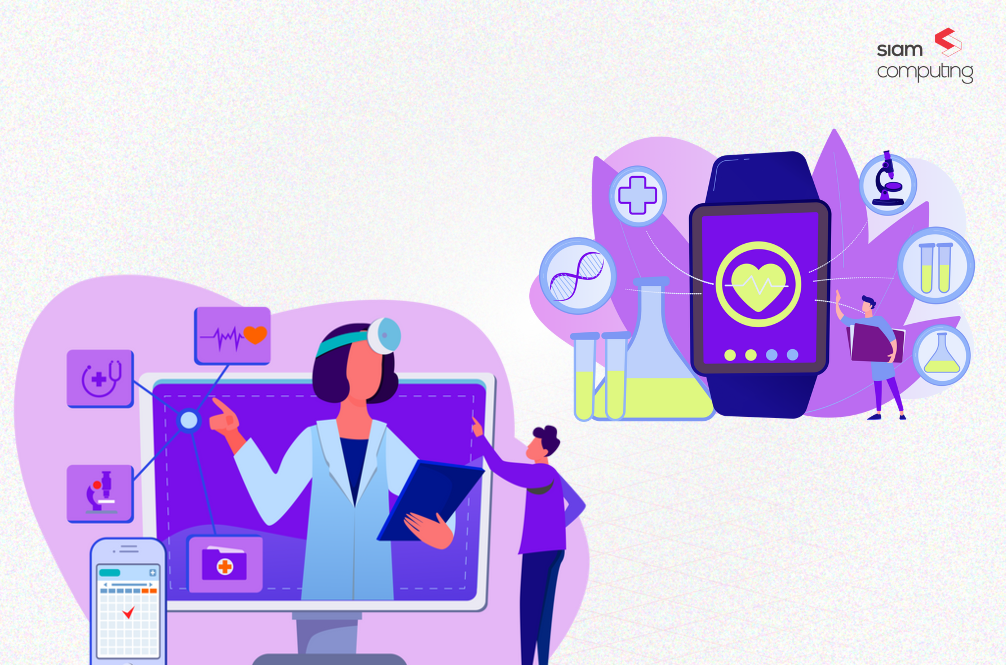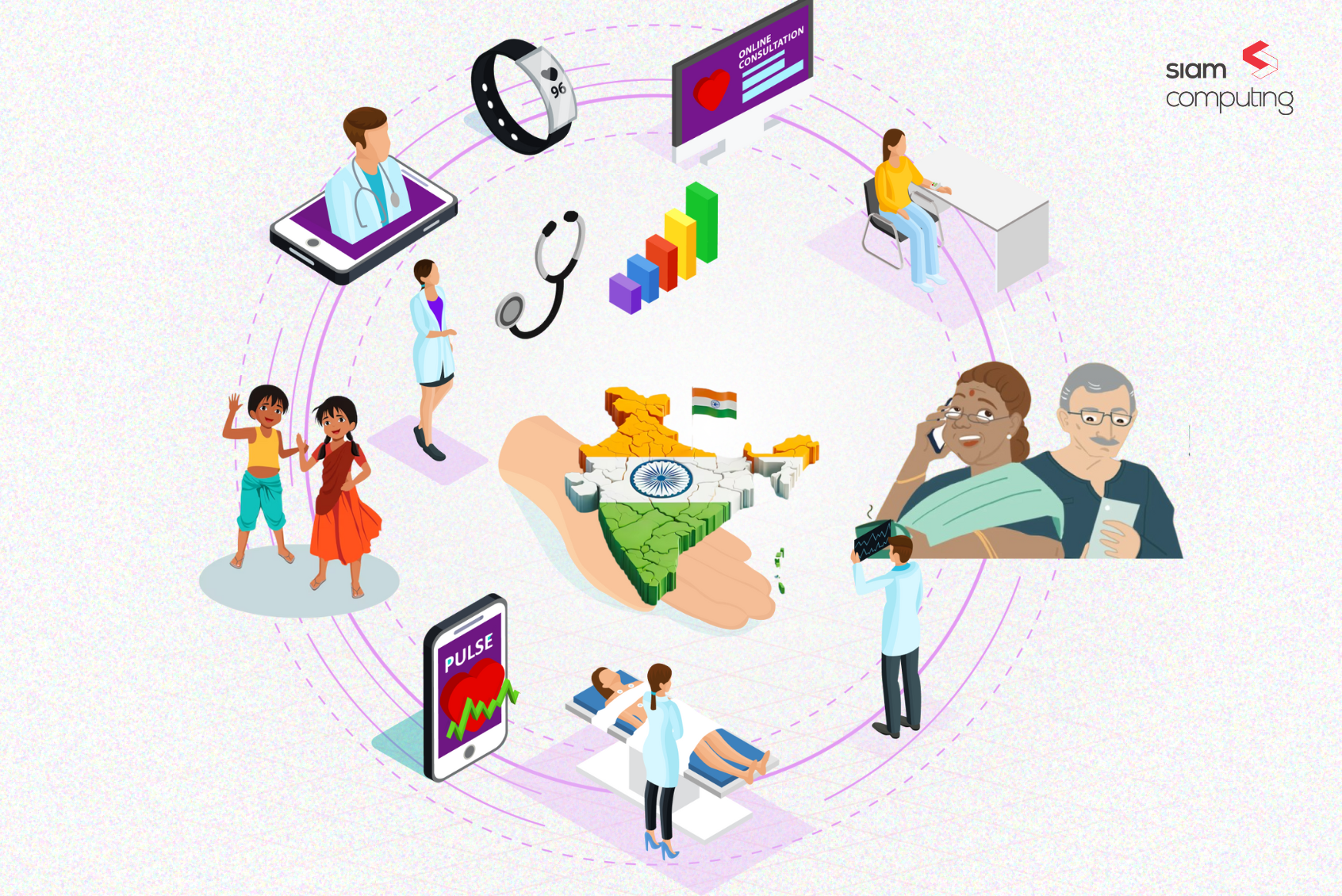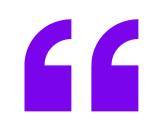Mobile apps have ushered in a digital way of life, seamlessly fulfilling everything from our essential needs to indulgent luxuries. It is now unimaginable to carry out everyday activities, adopt certain lifestyle habits, or navigate crucial personal milestones without mobile apps. In domains such as healthcare, mobile apps have become a crucial link between patients and healthcare providers.
Healthcare apps, primarily, have revolutionized the in-hospital experience and are addressing long-standing challenges faced by patients and caregivers. They solve many administrative and remote monitoring problems faced by doctors and hospitals in providing proactive care and continuous health monitoring for patients in ways that were once inconceivable.
Over the years, Siam Computing has aided the digital transformation of some of the leading healthcare providers. We have identified problems and inefficiencies in traditional healthcare systems and created digital solutions to help them bridge the gap between their ability to meet global healthcare standards and at the same time, give actual outcomes and a positive digital experience that patients have now come to expect from modern hospitals and healthcare services.
The State of Healthcare – Constrained Evolution
The current healthcare system is at a crossroads, transitioning from traditional offline practices to becoming a digital-first domain. However, the road to this transformation is yet to be taken even by major players in the field. Their aspiration to meet global health standards is limited by the lack of mediums to make the desired change and impact, leading to poor patient experience.
If you look at the in-hospital experience of a typical patient in a hospital setup, it loops around experiencing an illness or symptom, wandering through confusing referrals for treatment, making way through long queues for consultations, and living with endless confusion during the entire duration of their interaction with the hospital.
The in-hospital experience of the patient’s caretaker is wrought with inconveniences too. Hospitals often don’t provide clarity on the next treatment steps to these caregivers, they struggle to maintain manual health records, and wait in long queues while dealing with the emotional trauma of having a loved one admitted in a hospital.
The patients and their caretakers, the end-users of a hospital’s services, are yet to associate convenience and seamlessness with their healthcare experience in a traditional hospital setup. The trust that healthcare providers have been able to establish with the older generation of their patients now needs renewal with the millennial generation, who are accustomed to instant mobile updates and seamless services of the digital era.
Millennials – The Modern Decision Makers
The decision-making for choosing healthcare services is now divided between generations and tilts heavily towards the tech-savvy millennial generation, which accounts for 42% of the total population. This opens doors for healthcare providers to adopt a digital-first approach to improve hospital interactions and leverage millennials’ trust.
Healthcare apps for patients can eliminate all friction points in hospital services and bring the healthcare seeker and provider, closer. In doing so, quality healthcare services can become easily accessible in times of need, and chronic disease management is made more convenient for the patient and doctors, thereby improving patient outcomes and reducing the risk of fatalities.
The Modern Healthcare Space
Healthcare apps for patients have ushered in a new way of thinking when it comes to accessing healthcare services and interacting with healthcare providers. Let’s take a look at the overall dynamics of the new healthcare space enabled by mobile apps.
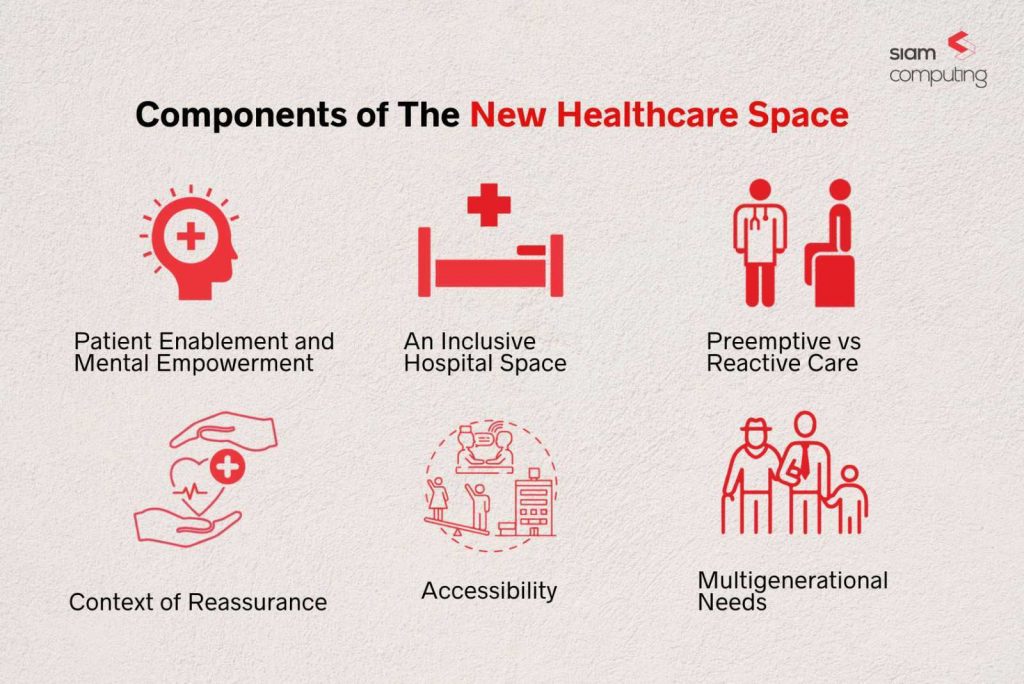
Patient Enablement and Mental Empowerment
In this new era of healthcare and rising end-user demands, the millennial patient or their caregivers expect healthcare providers to keep them updated and actively involved in the recovery process at every step.
Healthcare apps are a vital bridge enabling healthcare providers to provide the service their millennial users desire. Healthcare apps for patients not only enable patients to be in control of their health information, but they also help stimulate active responses and proactive patient inputs on the road to recovery.
Enabling patients to take charge of their own treatment can help provide a mental stimulus of being in control, and capable of achieving goals at a time when people are at the most vulnerable stages of their lives and feel helpless in not being able to do a thing.
Solving the Caregiver’s Angst
With the existing state of healthcare, the zenith of excellence for healthcare providers is limited to the overall management of immediate requirements of the patient. Unfortunately, this leaves no scope to consider the caregivers’ experience.
The patient’s caregivers, who are often their blood relatives or spouse, spend considerable time interacting with the hospital and face endless friction points that act as roadblocks to a smooth experience. Besides, these friction points will vary with each patient’s journey based on the help they need.
Healthcare mobile apps for patients can help ease the caregivers’ journey without needing them to be physically present for each interaction. Thus, healthcare providers can provide a comfortable hospital environment that empathizes with the caregivers. Besides, healthcare apps for patients are beneficial for all stakeholders involved in the process – caregivers, doctors and other medical staff.
Preemptive vs Reactive Care
Healthcare providers are by and large focused on providing excellent reactive care to patients. Despite the best medical efforts, this approach cannot always guarantee the best outcomes when it comes to patient recovery rates. Medical intervention under the reactive care set-up comes with the risk of life-threatening delays, and higher and hidden (uncertain) costs for patients.
Healthcare mobile apps for patients can help hospitals aim for preemptive care options by simply leveraging wearable devices that can be integrated with the digital health records database. As a result, healthcare providers can be at the forefront of preventing diseases in the first place by making health a part of life, enabling medical intervention before it is too late, and facilitating better health outcomes.
Accessibility
Healthcare providers who have embraced the technological transformation can now offer immediate access to doctors via telemedicine and online consultations.
This enables hospitals to cut down on long waiting times and ensure a frictionless experience while seeking medical help in times of need. Besides, providing immediate access to doctors can help healthcare providers cater to patients from older generations who need to see doctors more frequently.
Multi generational needs
The new healthcare space is also responsible for answering the needs of multiple generations, each having a different yardstick for choosing their healthcare partners
For example, the established centre of trust that hospitals have with the baby boomer generation might not be enough for extending the same trusted values to the millennial generation of their caregivers. This millennial generation relies on peer opinions often influenced by online reviews, visibility radar on socials, and transparency in the healthcare information available to them.
->Stand up and tall to the new age dynamics of the healthcare space with our Product Strategy and Consulting Team.
Healthcare Apps for Patients: A Window of Opportunity for Healthcare Providers
The lacks in the healthcare system are more than made up by tech. The use of mobile technology in the healthcare space has ample number of benefits for patients and their caregivers, and subsequently, a plethora of opportunities for healthcare providers to deliver patient experiences.
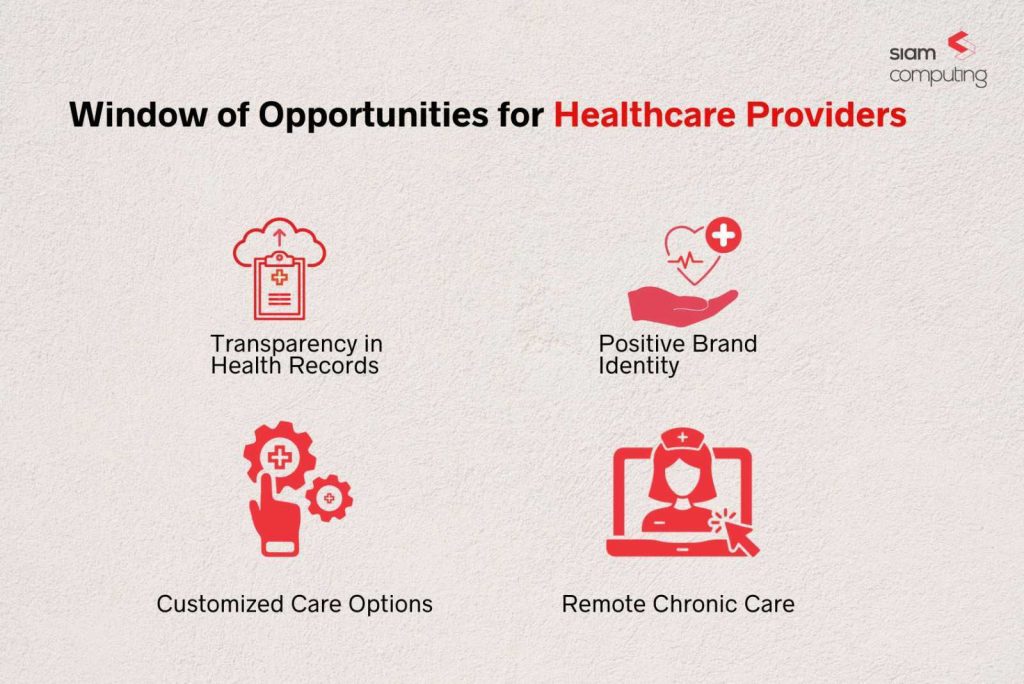
Transparency in Health Records
Skepticism on the part of patients and their caregivers is a looming concern due to a lack of transparency in health records. In the predominantly offline healthcare space, the flow of information is often perceived as arbitrary because there is no scope or bandwidth for doctors to explain why a certain path of treatment is necessary or why a certain diagnosis has been prescribed.
Healthcare providers can eliminate this skepticism by taking the digital route to health record consolidation by making a complete repository of treatment processes and outcomes for each patient readily available to them. This helps guide a buy-in from their end-user and results in better utilization of time and available resources.
Customized Care Options
The modern hospital space is full of opportunities to add value to multiple generations of the same family. However, merely consolidating health records is not enough to make way for a distinct user experience.
With mobile healthcare apps for patients, hospitals can accommodate varying needs across generations and help provide the most relevant information based on the health journey for each user. In addition, each user can access customizable data and action points instead of working their way around a vast repository of the entire family’s medical history.
In getting buy-in from all generations, notably the millennial generation of caregivers, healthcare providers can provide for a group of people that occupy a greater share of the market.
Positive Brand Identity
At the heart of healthcare lies empathy. Vulnerable life moments, emotional instability, and difficulty perceiving reality immediately call for empathetic partners to guide this journey towards desired health outcomes.
When designed right, mobile healthcare apps for patients can help seed empathy in healthcare proceedings, from acknowledging the distinct and independent entity of the caregiver to eliminating processes that unnecessarily strain the caregiver’s already compromised energy and mental space. In addition, this digital route can extend the scope of hospital performance beyond disease recovery to the overall experience with the hospital brand.
Remote Chronic Care
The pandemic brought a big challenge for all healthcare providers, but it also had a silver lining. Today’s patients willingly accept (and to some extent desiring) the involvement of tech in their health journeys.
At a time when the nation was struggling to provide the most basic health facilities to its people, remote chronic care came to the forefront of managing the excessive demand. Healthcare mobile apps for patients can simplify the chronic care experience in the face of the need for numerous hospital visits, long-term hospitalizations and recurring medical follow-ups.
->Tick all boxes for excellent patient and caregiver experience with our Product Strategy and Consulting Team.
Choose the Right Tech Partner to Build Your Mobile Healthcare App
The healthcare space is evolving faster than we can imagine, as are the needs and demands of patients and their caregivers. These end users of healthcare services, who are accustomed to ordering food on Swiggy and booking a cab on Ola, now demand that they get their healthcare services also at the click of a button.
This demand for digital-first services in the healthcare space is also no longer limited to just metropolitan cities. Market opportunities are ripe for taking even in Tier 2 and Tier 3 cities with the penetration of mobile technology and fast internet services.
So, healthcare providers who aim to guide patients towards better health outcomes need more efficient means of making quality healthcare services accessible. This is only possible if they take the digital-first approach and make use of mobile healthcare apps to provide their users with superior patient experiences.
If you aspire to provide world-class digital experiences in healthcare, Siam Computing can engineer it for you. We have built healthcare apps for major players in the healthcare space and have first-hand knowledge of helping them curate a superior patient experience.
Get in touch with our Product Strategy and Consulting Team to be at the forefront of healthcare and build solutions to the evolving user needs.



